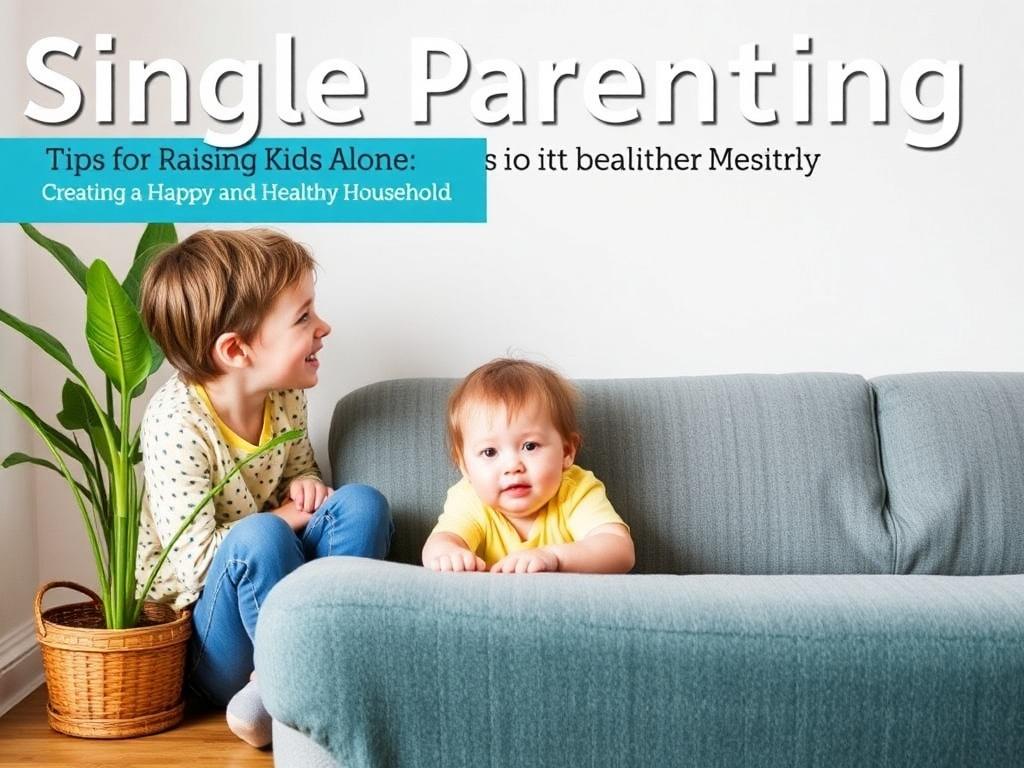SQLITE NOT INSTALLED
Single parenting is a journey that millions of people around the world navigate every day. Whether by choice or circumstance, raising kids alone brings a unique set of challenges and rewards. It’s a role filled with love, perseverance, and constant learning. If you’re a single parent or prepping to become one, understanding how to balance your life, manage stress, and build a loving home is essential. This article offers practical tips for raising kids alone, helping you thrive in your single parenting adventure with ease and confidence.
Understanding Single Parenting: The Reality and Myths
Before diving into the practical tips, it’s important to acknowledge what single parenting truly means. First and foremost, single parenting is not a failure or a lesser way to raise children. It’s a different family dynamic that can be just as nurturing and enriching as any other. The term ‘single parent’ refers to a mom or dad raising their children without the support of a partner, whether due to separation, divorce, death, or by choice.
One of the most common misconceptions is that single parents are struggling or inadequate. While it’s true that raising kids alone can sometimes feel overwhelming, countless single parents thrive and provide loving, supportive environments for their families. It’s important to dispel myths and replace them with understanding and encouragement.
Single parenting means learning to wear multiple hats—provider, nurturer, teacher, and more—all rolled into one. This effort requires patience, determination, and a good dose of self-care. It’s not about doing everything perfectly but about doing your best, with a heart full of love.
Why Tips for Raising Kids Alone are Crucial
Raising kids alone can be one of the most rewarding yet challenging experiences. Without a partner to share duties, single parents often juggle work, childcare, house chores, and emotional support all alone. That’s why tips for raising kids alone don’t just make life easier—they can reduce stress, promote healthy development in children, and encourage better mental health for parents.
Whether you’re newly single or have been raising your kids alone for a while, practical strategies can help you establish balance and ensure a happy family life. From organizing daily routines to seeking support networks, sooner or later, every single parent benefits from advice tailored to their unique circumstances.
Building a Strong Foundation: Essential Tips for Single Parents
Every parenting journey starts with a foundation based on love, structure, and resilience. When raising kids alone, having a firm base can help you manage the twists and turns more effectively. Let’s explore some important tips that set you up for success.
1. Establish a Consistent Routine
Children thrive on predictability—knowing what to expect provides a sense of security. For single parents, creating a routine can help manage time more efficiently and reduce the chaos that sometimes comes with solo caregiving.
Start by setting regular times for waking up, meals, homework, play, and bedtime. Consistency helps your children feel safe and helps you stay organized. Even on weekends, try to stick close to the routine to maintain stability.
Example Daily Routine for Single Parents:
| Time | Activity | Notes |
|---|---|---|
| 6:30 AM | Wake Up & Morning Hygiene | Prepare for school/work |
| 7:00 AM | Breakfast | Nutrition-filled meal to start the day |
| 8:00 AM | School/Daycare Drop-off | If applicable |
| 9:00 AM – 3:00 PM | Work or House Management | Your personal time during school hours |
| 3:30 PM | Homework/After-School Activities | Assist as needed |
| 5:30 PM | Dinner | Family mealtime and conversation |
| 7:00 PM | Relaxation/Playtime | Unwind together |
| 8:30 PM | Bedtime Routine | Reading, quiet time, lights out by 9 PM |
2. Practice Effective Time Management
With multiple responsibilities and no one else to share the load, time management becomes a lifeline for single parents. Prioritize your tasks and learn to say no when necessary, so you don’t get overwhelmed.
Use planning tools such as calendars, apps, and reminders to keep track of appointments, school events, doctor visits, and deadlines. Breaking down big tasks into smaller steps makes everything more manageable.
Consider this simple time management trick: categorize your tasks into “urgent,” “important,” and “can wait.” This helps you focus on what really needs your attention and save energy for your kids.
3. Build a Support Network
Even if you’re raising kids alone, you don’t have to do it in isolation. Developing a trusted support network is one of the best tips for raising kids alone. Friends, family, neighbors, teachers, and community groups can all be invaluable.
Don’t hesitate to ask for help—whether it’s babysitting, emotional support, or simply sharing parenting advice. Being connected not only eases your burden but also enriches your child’s social world.
- Join local parenting support groups
- Connect with other single parents for advice and companionship
- Reach out to school counselors and pediatricians for professional support
- Utilize community resources such as childcare programs and recreational activities
Financial Tips for Single Parents: Managing Money and Planning Ahead

Money management is often one of the most pressing concerns for single parents. Raising kids alone typically means managing all financial responsibilities on your own. However, financial stress doesn’t have to take over your life. With careful planning and smart choices, you can achieve stability and provide well for your children.
4. Budget Wisely and Track Expenses
Creating a comprehensive budget lets you see exactly where your money goes and helps you make informed decisions. Include fixed expenses like rent and utilities, variable costs like groceries, and savings goals.
Tracking your expenses daily or weekly ensures that you avoid surprises and can adjust if necessary. Many free apps and online tools make this task easier than ever.
5. Prioritize Saving and Emergency Funds
Building an emergency fund is essential for single parents, as unexpected expenses can arise anytime. Aim to save enough to cover three to six months of living expenses if possible. Even small monthly contributions add up over time.
Additionally, save for your children’s future education, healthcare, and other major needs. Setting financial goals keeps you motivated and focused on long-term security.
6. Explore Financial Assistance Programs
Depending on your situation, you might qualify for government assistance programs designed for single parents. These may include childcare subsidies, food programs, tax credits, and healthcare support. Don’t hesitate to explore these options as they can significantly ease financial pressure.
| Program | Purpose | How to Apply |
|---|---|---|
| Childcare Subsidies | Help cover childcare costs | Local social services office or online |
| Supplemental Nutrition Assistance Program (SNAP) | Provide food assistance | Apply through state health department |
| Earned Income Tax Credit (EITC) | Tax credit for low to moderate income earners | File federal taxes with qualifying documentation |
| Medicaid/CHIP | Healthcare coverage for low-income families | State health department applications |
Emotional Wellbeing: Nurturing Yourself and Your Children

Raising kids alone can be emotionally taxing. Single parenting requires you to be strong, yet it’s equally vital to take care of your mental health and emotional wellbeing. Both you and your children benefit from a positive, supportive environment.
7. Build Open Communication Channels
Creating a home where your kids feel safe to express their feelings builds trust and resilience. Encourage your children to talk about their emotions, problems, and dreams openly. This can prevent feelings of isolation and misunderstanding.
Make time for daily check-ins or share rituals like bedtime stories or evening chats to foster connection.
8. Practice Self-Care Without Guilt
Taking time for yourself is not selfish—it’s essential. Self-care might look like a quiet walk, reading a book, or having a coffee with a friend. When you prioritize your wellbeing, you replenish the energy and patience you need to be an effective parent.
Remember, you are a role model. Demonstrating healthy habits and boundaries teaches your children how to care for themselves.
9. Seek Professional Help When Needed
If stress, anxiety, or depressive feelings become overwhelming, don’t hesitate to speak with a counselor or therapist. Mental health professionals can provide tools and strategies tailored to your unique situation.
Many communities offer low-cost or sliding scale therapy services designed for families and single parents.
Practical Tips for Raising Kids Alone: Creating a Happy and Healthy Household

Beyond routines and finances, everyday living offers opportunities for growth and connection. Here are more tips for raising kids alone, focusing on building a happy, healthy household.
10. Foster Independence in Your Children
Teaching kids to be independent empowers them and reduces your workload. Age-appropriate chores, decision-making opportunities, and responsibilities give children a sense of accomplishment and maturity.
For example, involve younger children in packing their school bag or tidying their toys, and encourage older kids to prepare simple meals or manage homework schedules.
11. Maintain Healthy Boundaries
Single parenting doesn’t mean being “on” all the time. Set clear boundaries to protect your personal space and time. This can mean establishing rules about work hours, phone use, or personal downtime.
Communicate these boundaries clearly to your children so they understand and respect them.
12. Make Time for Fun and Connection
Life can be busy, but don’t forget to have fun as a family. Plan activities like picnics, game nights, or simple outings. These moments build lasting memories and strengthen your bond.
- Weekend nature walks or bike rides
- Cooking a meal together
- Movie nights with popcorn
- Arts and crafts projects
Tips for Raising Kids Alone: Educational and Social Development
Child development flourishes best when supported both academically and socially. Single parenting might present challenges in providing extra tutoring or enriching experiences, but creative approaches can help.
13. Encourage Educational Growth
Take an active interest in your child’s schooling. Attend parent-teacher conferences, review homework, and provide a quiet study space. If extra help is needed, look for affordable tutoring programs or online resources.
Supporting their educational interests encourages curiosity and confidence.
14. Promote Social Interaction
Encourage your children to build friendships and participate in group activities. Playdates, sports teams, clubs, and community classes offer chances to develop social skills and enjoy peer connections.
These social interactions are vital for emotional health and can help children feel integrated and supported.
Final Thoughts: Single Parenting as a Journey of Strength and Love
Single parenting is more than a role or responsibility—it’s a journey filled with challenges, victories, tears, laughter, and endless love. Every day spent raising kids alone is an act of incredible courage and commitment.
By embracing routines, managing finances, nurturing emotional wellbeing, and fostering independence in your children, you can create a fulfilling and joyful family life. Remember, tips for raising kids alone are tools to help—not rules to limit you. Adapt them to your unique circumstances and personal style.
If you’re reading this and navigating single parenting, know you’re not alone. There is a strong community of single parents sharing your journey, ready to support and celebrate with you. Your love, effort, and presence are what matter most to your children.
Thank you for dedicating your time and heart to raising amazing kids—and may your single parenting journey be one of strength, growth, and happiness.
